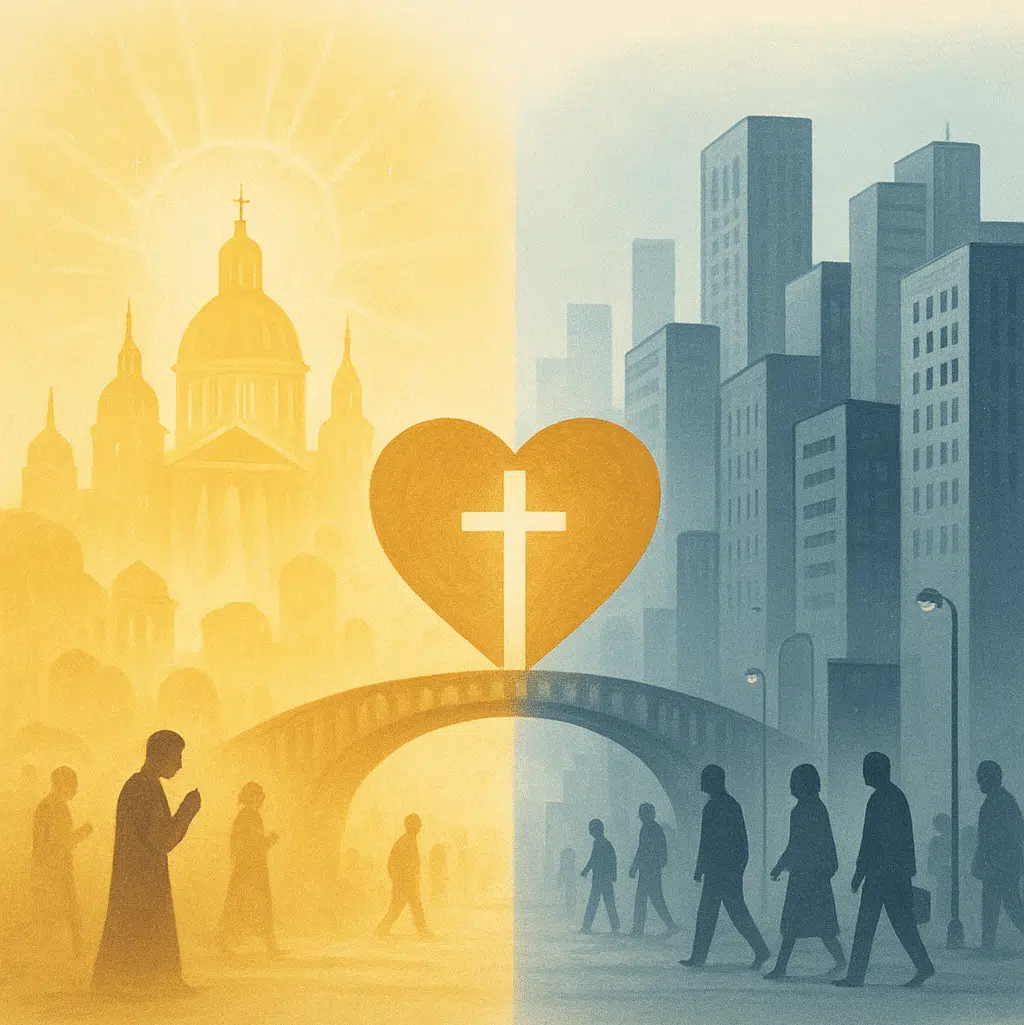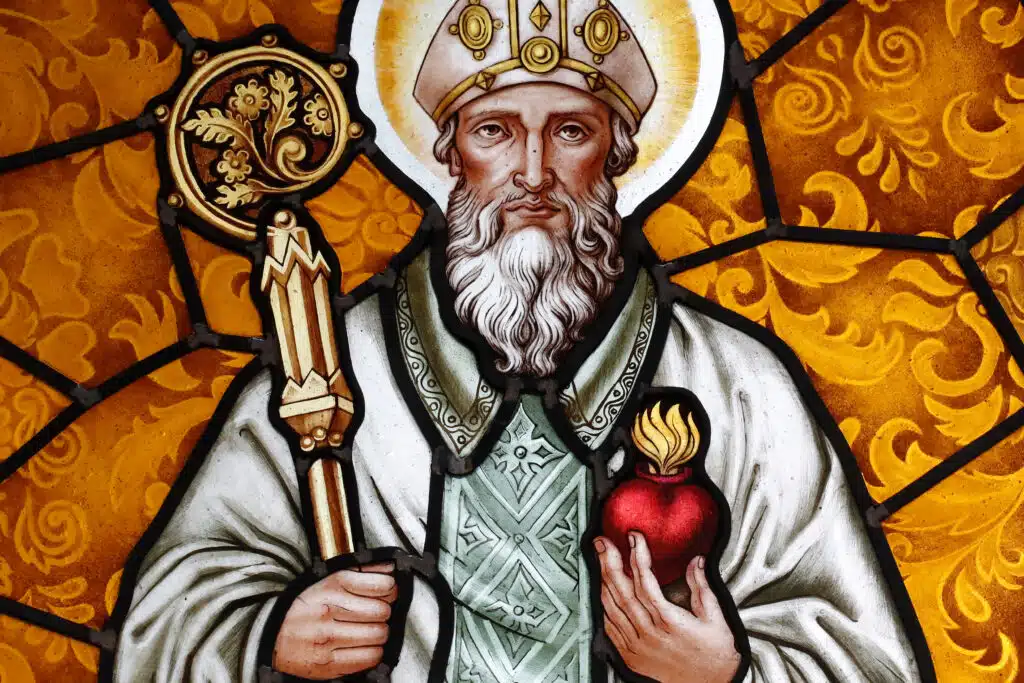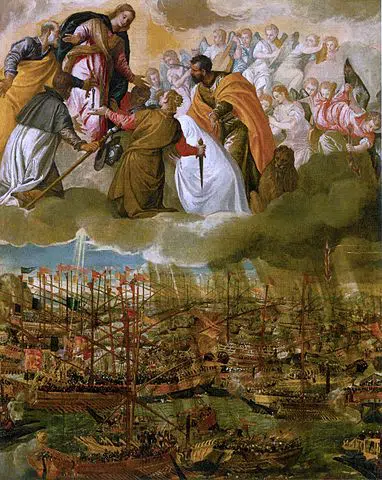“Two cities, then, have been created by two loves: that is, the earthly by a love that extends itself even to contempt of God, and the heavenly by love of God extending to contempt of self.” ― St. Augustine, The City of God
What role should the faith that Catholics hold play in their lives, including (or perhaps especially) outside of the time they spend in church?
In some ways, the answer to this question is obvious. Clearly, if Catholics believe what they say they believe, then their faith must be central to and affect everything they do. As St. Paul wrote to the Thessalonians, “Rejoice always, pray without ceasing, give thanks in all circumstances; for this is the will of God in Christ Jesus for you” (1 Thes 5:16-18).

Pray always. This command from the great apostle lays out the ideal for Christians in every generation. Everything we do must be sanctified. It is not so much that a Christian must always be engaged in explicit vocal or even mental prayer, but that every part of a Christian’s life should be subsumed into his faith and directed towards God.
Faith in Every Action
As St. Thérèse of Lisieux so eloquently taught in The Little Way, even the most mundane aspects of life can take on supernatural value if they are performed with a Christ-like love. Thus, even cooking a meal, taking out the garbage, or bathing a child can become an act of one’s faith, to the extent that one sanctifies it by doing it with extraordinary love.
Then there are the famous writings of Brother Lawrence, a 17-century Carmelite friar, who exhorted his readers to do what he called the “practice of the presence of God.” The goal of this practice is to cultivate a permanent awareness that God is present to the soul. In this way, even when engrossed in work or other activities, there is still a part of the person, in the inmost self, that resides with the Creator.
And yet, in the messiness of lived life, Christians are often faced with complex circumstances in which it is less than clear how, precisely, the Christian ought to act. And indeed, as the broader culture becomes ever more secular and anti-Christian, the number of these situations are becoming more numerous.
Undivided Faith in Daily Life
How, for instance, should a mid-level employee at a large corporation behave when the corporation enforces “Pride” celebrations during June? Should they speak up and risk losing their job, or should they stay silent and keep their head low, in the hope of preserving their employment and supporting their family?
The answers to these questions are not always black and white. While a person can never do something that is intrinsically immoral, even if doing so could achieve some other, even “greater” good (cf. Catechism of the Catholic Church [1], nos. 1756, 1761, & 1789), there can be a delicate balancing act between openly living one’s faith, and making prudential decisions about which battles are worth fighting.
However, what the Church has made quite clear is that Catholics cannotdraw a sharp dividing line between their faith and the rest of their life. To believe that Christ is Lord, and that He rose from the dead, and that the pope and the bishops are the successors of the apostles, is something that, by its very nature, must transform one’s life from the top to the bottom.
The question of precisely how to integrate one’s faith with the totality of life is faced by countless people from all classes and ways of life, from Catholic executives who are concerned that their HR departments are promoting “woke” policies, to the security guard who must figure out how to attend Sunday Mass while working back-to-back weekend night shifts.
It is an issue that is especially pertinent for Catholic legislators in contemporary democracies, who at times can feel that there is an unavoidable division between their faith-based convictions, and their role in representing the will of their constituents. Whatever they might believe as individuals, it would seem that their job is more nuanced that simply rubberstamping in law whatever is put out by the Pope or the Vatican.
City of God vs. City of Man
In a recent address [2], Pope Leo XIV provided a framework through which to view questions like this. Speaking directly to the unique calling of Catholic legislators, he reflected on St. Augustine’s famous distinction between the “City of God” and the “City of Man.”
These two cities, the Holy Father explained, represent “two orientations of the human heart and, therefore, of human civilization.” The City of Man is “built on pride and love of oneself, is marked by the pursuit of power, prestige and pleasure,” whereas the City of God is “built on love of God unto selflessness, is characterized by justice, charity and humility.”
The role of Catholic legislators, summarized Pope Leo, is “to be bridge-builders between the City of God and the City of Man.” To do this, he suggested, legislators must resist the temptation to separate these two cities: to exercise their role as politicians as if it pertains solely to the City of Man, and to enter the City of God as if it is a temple set apart from the lived reality of everyday life.
St. Augustine himself taught that the City of God and the City of Man are “intertwined,” pointed out the Holy Father. And he encouraged Christians “to infuse the earthly society with the values of God’s Kingdom, thereby directing history toward its ultimate fulfilment in God, while also allowing for authentic human flourishing in this life.”
Pope Leo suggests to legislators and those serving in government that the vision of humility and love proposed by St. Augustine is a “spiritual compass” in an age of shifting alliances, corporate power, and technological dominance. Rather than simply accepting or promoting the dominant views of the age, said Pope Leo, Catholic legislators must first ask themselves what authentic human flourishing looks like, and then legislate from that standpoint.
“Today,” he noted, “a flourishing life is often confused with a materially wealthy life or a life of unrestricted individual autonomy and pleasure. The so-called ideal future presented to us is often one of technological convenience and consumer satisfaction. Yet we know that this is not enough. We see this in affluent societies where many people struggle with loneliness, with despair and a sense of meaninglessness.”
Authentic Human Flourishing Beyond Materialism
Authentic human flourishing, the pope goes on to explain, must take into account every aspect of man: the physical, social, cultural, moral, and spiritual. The. Catholic vision of human flourishing “is rooted in natural law, the moral order that God has written on the human heart, whose deeper truths are illuminated by the Gospel of Christ,” continues Pope Leo. “In this regard, authentic human flourishing is seen when individuals live virtuously, when they live in healthy communities, enjoying not only what they have, what they possess, but also who they are as children of God.”

Looked at this way, it is impossible for a Catholic legislator to separate his faith from his work. It is true that his job is not necessarily simply to translate the Catechism or The Code of Canon Law into civic law through legislation. However, he cannot possibly, in good conscience, support legislation that radically violates this holistic vision of human flourishing. For this reason, when it comes to grave, intrinsic moral evils that directly target human life or human dignity, the Catholic legislator cannot in good conscience vote for legislation permitting these practices, regardless of how his or her constituents feel about the matter.
And, more proactively, the Catholic legislator must at one degree or another actively pursue a program of translating the rich, universal anthropology captured in Catholic social teaching into laws that promote flourishing communities, families, and individuals.
Gaudium et Spes and the Error of a Divided Life
Ultimately, concluded the Holy Father in his address, what our civilization becomes “depends on which ‘love’ we choose to organize our society around – a selfish love, the love of self, or the love of God and neighbor.”
Speaking directly to Catholic legislators, the Holy Father said: “I would like to urge you this morning to continue to work for a world where power is tamed by conscience, and law is at the service of human dignity. I also encourage you to reject the dangerous and self-defeating mind-set that says nothing will ever change.”
Past popes and the Vatican have often addressed this topic of how the Catholic in the world is to integrate his or her faith, and secular duties. Another useful document [5], from the Dicastery for Promoting Integral Human Development, speaks more specifically to Catholic business people who face many obstacles in exercising their vocation in a moral way. These obstacles can take many forms, such as corruption, accounting manipulation, bribery, infringement of civil rights, fraud, theft, insider trading, and poor stewardship of resources, and more.
But, the document continues, the most significant obstacle for a business leader on a personal level is leading a “divided” life. This divided life is the split between a person’s faith and daily business practice, which can lead to imbalances and misplaced devotion to worldly success. Here, the document is echoing Gaudium et spes [6], no. 43, which speaks of “the split between the faith which many profess and their daily lives.” This, wrote the Council Fathers, is “one of the more serious errors of our age.”
Christians Are Born for Combat
As Christians, we must constantly be reminded that the call of justice is not something which can be reduced to the categories of this world. This is the beauty of the Pastoral Constitution on the Church in the Modern World (Gaudium et spes), evident in the very structure of the Second Vatican Council’s text; only when we Christians grasp our vocation, as having been created in the image of God and believing that “the form of this world is passing away… [and] that God is preparing a new dwelling and a new earth, in which justice dwells” (Gaudium et spes, no. 39), can we address the urgent social problems of our time from a truly Christian perspective.
“It is not always easy to reconcile the demands of the Gospel with the demands of business and commerce,” said [7] Pope Francis during a meeting with young Catholic entrepreneurs and businessmen in 2019. However, the “‘evangelical values’ that entrepreneurs and managers hope to implement in their businesses,” emphasized the late Holy Father, “provide an opportunity for ‘genuine and irreplaceable Christian witness.’” In other words, the businessperson has a fundamental role in transforming society, which begins with respect for the dignity of human work and the subjective dimension of work, seeing that “work is work with others and work for others” (Centesimus annus [8], no. 31).

Aligning a Catholic legislator’s or businessperson’s core values and mission does not just happen; it must be intentional, attended to, and nurtured. Tragically at times, we fail to appreciate the life God so generously offers. We exhaust ourselves with natural pursuits, while the supernatural, the spiritual, remains ignored.
As Pope Leo XIII says, “Christians are born for combat” (On Christians as Citizens [9]). Thus, each ordinary moment becomes an extraordinary opportunity to magnify the greatness of God, bearing constant witness to the transforming power of His eternal love.
Modern society would have Christians remain silent, especially on fundamental Gospel values – i.e. human dignity, respect for every life, born and preborn, and the marriage between one man and one woman, euthanasia, etc. However, when tempted to say nothing or to compromise on essential Christian tenets or waver in the face of pressure and convenience, Catholic legislators and those serving in government should remember “there is no fear in love, but perfect love drives out fear” (1 Jn 4:18).